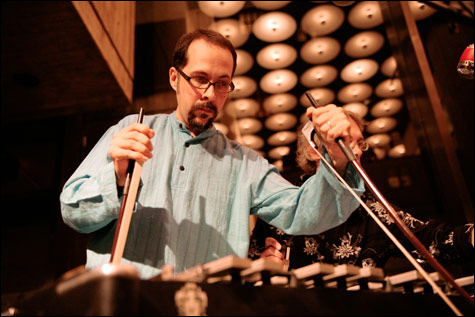
MADE TO ORDER Hollenbeck’s Large Ensemble disc is a major achievement. |
When I reach John Hollenbeck by phone, he's on a sojourn typical of the modern itinerant composer — a week-long teaching residency. In this case, he's at Towson State University, Maryland, and his classes run the gamut: composition, improvisation, coaching student ensembles, giving drum lessons, playing with his band the Claudia Quintet. And he says he's surprised to have been invited to bring the band to Boston's First Night festivities. "Guys like us, we're not used to New Year's Eve gigs."
Although Hollenbeck seems unaware that First Night usually encompasses classical and jazz, his point is well taken. Those "guys like us" tend to be players and composers with a jazz background and an uncategorizable experimental streak. Like their classical brethren, they fall under the rough rubric of "concert music."
Hollenbeck, who's 41, studied percussion and composition at the prestigious Eastman School of Music in Rochester and since then has worked all manner of journeyman gigs. (He's the younger brother of Boston percussionist and composer Pat Hollenbeck.) But it's as a composer that he's come into his own, leading and playing drums in the Claudia Quintet and his Large Ensemble. He likes cyclical rhythmic patterns in the minimalist mode of Philip Glass and Steve Reich, jazz harmonies, unconventional instrumentation, all manner of world-music colors, "classical" orchestrations and structures. The Claudia Quintet boasts vibes, accordion, and clarinet in the front line. Hollenbeck is typical of a generation fluent in several traditions and willing to work in them all — simultaneously.
In the past, I've been put off by the driven, obsessive nature of some of his work — his single-minded pursuit of a compositional idea. There'd be no conventional "swing" to offer relief, no bravura improvised solos, just a perfectly synchronized musical engine grinding away. It had a take-it-or-leave-it quality that I found easy to leave.
But this year's Large Ensemble album, Eternal Interlude (Sunnyside), reawakened me to Hollenbeck. The rhythmic cycles again drive the pieces, but they're layered in multi-hued arrangements, from low brass to high reeds and flutes, and informed with a new expansiveness and lyricism. There's more command of harmony and color, tension and resolution. "Foreign One," a dense reworking of Thelonious Monk's skittery theme "Four in One," breaks open for a bruising tenor solo. "Perseverance" is a sprawling (17:45) concerto for three saxophones. And "Eternal Interlude" is that "still center of the turning world" that's rich with unfolding detail. The expansive lyricism is pervasive, even amid the spoken-word recitation of "Cloud" (by band singer Theo Bleckman), with its backing of brass chorale. The album is, by any measure, a major achievement.
Hollenbeck tells me that the creation of the Claudia Quintet began with his search for something different — a departure from his jazz roots. Over the years and through gigs, he met accordionist Ted Reichman, clarinettist (and tenor player) Chris Speed, and vibist Matt Moran. "I'd never heard a front line of clarinet, accordion, and vibes. I'd heard clarinet and vibes, and clarinet and accordion, but not that. I liked it from the very beginning."